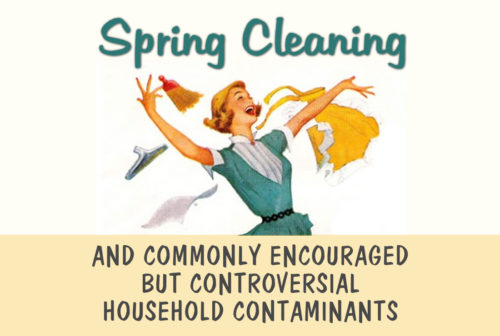
Oh yes, the warm weather has hit, and the flowers are a’poppin – that means it’s time for spring cleaning! At SFC, we are cleaning our homes, our habits, and our bodies. You see, we care deeply for your well-being, and our goal is to provide you with opportunities to be your best through it all, including spring cleaning. For the month of April, this means we want you to launder your home literally and figuratively. To get started, we made a list of the top commonly encouraged (but often controversial) household toxins to be aware of, where to find them, and solutions to avoid them.
In no specific order…
- Fluoride (water fluoridation): Fluoride is a drug that was first added to public water in 1945 to prevent tooth decay. In 2016, the Centers for Disease Control and Prevention named community fluoridation of drinking water one of the 10 greatest public health achievements of the 20th century. But, according to a study by The World Health Organization, the rate of tooth decay in the United States follows the same declining trends as other advanced countries, 97% of which don’t fluoridate their drinking water. Chicago water has been fluoridated since 1956, and 64% of their 3rd graders suffer from tooth decay. Fluoride is also often said to build stronger teeth, but according to Dr. Joseph Mercola in 2014, the fluorapatite layer formed on your teeth from fluoride is a mere six nanometers thick (you’d need 10,000 of these layers to get the width of a hair). The risks of fluoride exposure (even at “safe levels”) include endocrine disruption (pineal and thyroid glands), decreased IQ, and bone decay.
- Formaldehyde / Formalin: According to Cancer.org, published in 2014, Formaldehyde is used primarily as a disinfectant or a preservative in some cases. This ingredient is found in dozens of common household cleaning products, as well as food products, cosmetics, hygiene products, and medicines. Formaldehyde is recognized by the World Health Organization as a known carcinogen (cancer causing agent).
- Preservatives (Parabens) – Synthetic preservatives were first introduced to personal care products in the 1950’s. According to the Campaign for Safe Cosmetics (CSC), “What worries public health advocates [now] is that while individual products may contain limited amounts of preservatives within safe limits set by the U.S. Food & Drug Administration, cumulative exposure to the chemicals from several different products could be overloading our bodies and contributing to a wide range of health problems… [including] hormone dysfunction, breast cancer, and reproductive toxicity”.
- BPA (Bisphenol A) – BPA was first approved by the FDA in the 1960’s. It Is an ingredient used to make plastics and resins, especially those that contain food products (water bottles, canned goods, food storage containers etc.) In 2008, the Center for Disease Control performed a study that showed 92% of US adults showed traces of BPA in their urine. According to a study published in 2015 by PubMed.gov, BPA has been shown to play a role in the pathogenesis of several endocrine disorders including female and male infertility, precocious puberty, breast and prostate cancer, and several metabolic disorders including polycystic ovary syndrome (PCOS).
- Round Up® (Glyphosate) – Conventional farming practices attempt to artificially increase crop yield through the use of chemicals, such as Glyphosate. Glyphosate was patented by Monsanto in the early 1970’s as an the herbicide (weed killer), and is now being used on residential lawns. Although highly debated, exposure to Round Up® has been linked to liver disease, birth defects, reproductive problems, loss of beneficial gut bacteria, and DNA damage in embryonic, placental and umbilical cord cells. Please refer to https://usrtk.org/pesticides/glyphosate-health-concerns/ for additional information.
SOLUTIONS WE RECOMMEND:
1.) Don’t freak out. Take a deep breath. Care, but don’t carry. Make a plan and take action, such as…
– Use Fluoride-free toothpaste (Jason Powersmile), and obtain a home water filter (Berkey or Alexpure brand)
– Use preservative-free hygiene products and household cleaners (Frangipani skin care, Young Living Thieves cleaners, Dr Bronners soaps)
– Use glass or stainless steel containers, and avoid plastics
– Avoid using weed killers like Round Up, and consume foods labeled as Certified Organic
After all this reading, if you are unsure about an ingredient, the EWG (Environmental Working Group) posts a free, online, chemical-look up resource to determine the toxicity level of most ingredients on the market. Check it out at https://www.ewg.org/skindeep/
That’s all, folks! It’s time for your Spring Cleaning, inside and out. If you are interested in learning more about our list above, or participating in a spring detox program, please call our office at 317-863-0365.
RESOURCES:
https://articles.mercola.com/sites/articles/archive/2013/04/30/water-fluoridation-facts.aspx
https://www.cancer.org/cancer/cancer-causes/formaldehyde.html
https://www.webmd.com/children/what-is-bpa-is-it-safe#1
https://www.ncbi.nlm.nih.gov/pubmed/25813067
https://www.scientificamerican.com/article/should-people-be-concerned-about-parabens-in-beauty-products/
http://www.ewg.org/guides/cleaners/content/cleaners_and_health
https://usrtk.org/pesticides/glyphosate-health-concerns
The information provided by the Stillpoint Family Chiropractic Wellness Blog is not intended or implied to be a substitute for professional medical advice, diagnosis, or treatment. All content, including text, graphics, images, and information, contained on or available through this website is for general information purposes only. Stillpoint Family Chiropractic assumes no responsibility for its accuracy, and encourages its readers to confirm all details from alternate sources, and any and all content is subject to change without notice.
